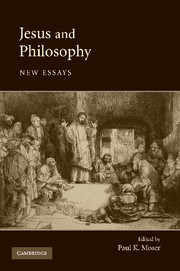Book contents
- Frontmatter
- Contents
- Preface
- Contributors
- Introduction: Jesus and Philosophy
- PART ONE JESUS IN HIS FIRST-CENTURY THOUGHT CONTEXT
- 1 Jesus: Sources and Self-Understanding
- 2 Sipping from the Cup of Wisdom
- 3 The Jesus of the Gospels and Philosophy
- 4 Paul, the Mind of Christ, and Philosophy
- PART TWO JESUS IN MEDIEVAL PHILOSOPHY
- PART THREE JESUS IN CONTEMPORARY PHILOSOPHY
- Index
- References
4 - Paul, the Mind of Christ, and Philosophy
Published online by Cambridge University Press: 05 June 2012
- Frontmatter
- Contents
- Preface
- Contributors
- Introduction: Jesus and Philosophy
- PART ONE JESUS IN HIS FIRST-CENTURY THOUGHT CONTEXT
- 1 Jesus: Sources and Self-Understanding
- 2 Sipping from the Cup of Wisdom
- 3 The Jesus of the Gospels and Philosophy
- 4 Paul, the Mind of Christ, and Philosophy
- PART TWO JESUS IN MEDIEVAL PHILOSOPHY
- PART THREE JESUS IN CONTEMPORARY PHILOSOPHY
- Index
- References
Summary
JESUS, PAUL, PHILOSOPHY
What difference does Jesus make to Paul? And what implications are there, in that difference, for the practice of philosophy?
To answer these questions, we must negotiate difficult territory. The pitfalls include Paul's stance toward philosophy, his relationship to Jesus, and the sources we should trust – not to speak of the conflicting opinions that scholars, skeptics, and true believers have voiced on every detail of such a journey, including the nature of philosophy itself.
The most obvious obstacle for many is the very juxtaposition of Paul and philosophy. Did he not write in Colossians 2:8, “Take care that no one carries you away with philosophy and empty deceit according to human tradition, according to the elements of the cosmos, and not according to Christ”? Well, perhaps not: the weight of scholarly opinion is against Paul's authorship of that letter, so immediately we encounter a problem with what counts as evidence. And yet it is true that running through Paul's letters generally accepted as genuine is the stark contrast between human and divine wisdom, a reliance on revealed truths that cannot be achieved by human beings, and a claim to have had disclosed to him mysteries or secrets not previously available. We will have to assess judiciously the implications of his apparent distaste for philosophy, but however that turns out, it remains the case that Paul betrays very little interest in the philosophical activity of his day.
- Type
- Chapter
- Information
- Jesus and PhilosophyNew Essays, pp. 84 - 106Publisher: Cambridge University PressPrint publication year: 2008



